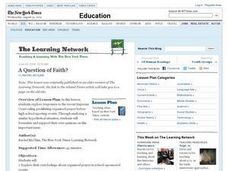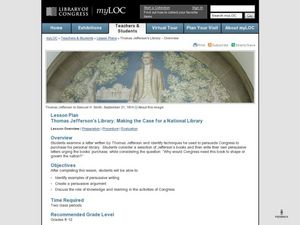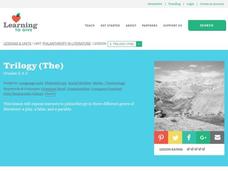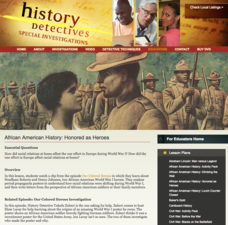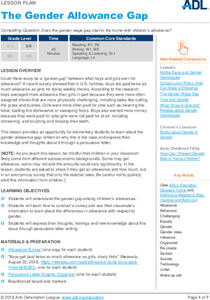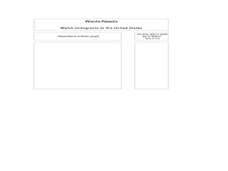Curated OER
What Are the Issues?
Investigate and report on three issues related to a current election. Elementary aged learners research information about specific issues, develop an opinion, and write a persuasive essay using supporting details and evidence to support...
Classroom Law Project
Should we believe everything we read? Becoming a discerning consumer of media
Class members investigate the role media should play in a healthy democracy. As part of this study, groups analyze political advertising, use FactCheck to assess not only the veracity of but the persuasions techniques used in candidates'...
Franklin D. Roosevelt Presidential Library & Museum
Pearl Harbor Activity #2: Why Do Words Matter?
Words matter! That's the big idea behind an activity that asks scholars to replace words in FDR's "Day of Infamy" speech with synonyms. They then listen to a recording of President Roosevelt's address and compare his version to their own.
Curated OER
Views on Downloading: Developing Persuasive Writing Techniques
Students write persuasively by convincing others of their point of view about music downloading.
Curated OER
The Gentle Art of Persuasion: Techniques for Persuading Different Audiences
Students examine the use of persuasive arguments to varying audiences. They define persuasion, read and discuss an article on whether P.E. should be optional, summarize the pros and cons of P.E., and write a letter or a speech.
Newseum
Propaganda Through History: Analyzing Historical Sources
Working in teams, pairs, or individually, scholars select one resource from a gallery of historical sources and consider which examples might be considered propaganda, the techniques used to persuade audiences, and evaluate how the...
Newseum
Disinformation Nation: Is It Propaganda?
Propaganda or not? That is the question researchers must answer as they analyze techniques used in ads. Pupils use a three-part definition to determine if the ad is propaganda or advertising.
Newseum
Political Persuasion: It’s All About Image
Political candidates work hard at creating an image they believe will appeal to voters. High schoolers collect 10 photos and other images of a candidate and analyze them to determine what techniques create a positive or negative impression.
US Institute of Peace
Practicing Conflict Analysis
Does your conflict management style keep you cool and persuasive, even under pressure? Young behaviorists practice analyzing conflicts and using conflict management skills during lesson five in a 15-part series. The resource contains...
Newseum
Disinformation Nation: Separating Politics and Propaganda
Separating political rhetoric from propaganda is no small feat. Class members are challenged to examine two different sources about a candidate in an upcoming election and determine whether the primary purpose of the source is to inform...
Curated OER
A Question of Faith?
Should organized prayer be prohibited at high school sporting events? Students explore their own feelings about prayer in school-sponsored events, before discussing the recent Supreme Court decision banning public prayer at high school...
Curated OER
Lesson PlanThomas Jefferson's Library: Making the Case for a National Library
Students explore techniques of persuasive writing. In this persuasive writing lesson, students examine primary sources regarding the sale of Thomas Jefferson private library to Congress. Students write their own persuasive letters...
Curated OER
Talking about Advertising
Students examine tools and techniques of advertising. In this advertising lesson, students view ads, disvuss common terms used, and analyze techniques. Students are presented with situations and must design and advertisement for the...
Curated OER
Smiles Change the World
Students develop speaking and listening skills while evaluating a list. In this consensus lesson, students define consensus and discuss how it might be used at recess. After students understand how consensus works, students review and...
Curated OER
Philanthropy in Literature
Students research philanthropy in three genres: a play, a fable, and a parable. Students read an Aesop fable and answer questions in groups. Students complete steps in two worksheets from 'The Good San Franciscan' and 'Someone Should.'...
Newseum
Weed Out Propaganda
Young scholars study four essential propaganda techniques: Simplification, Exploitation, Exaggeration, and Division (S.E.E.D.). Individuals select an example of propaganda from the past and present then compare how the key elements have...
PBS
African American History: Honored as Heroes
To gain an understanding of the treatment of African American soldiers during World War I, class members watch an excerpt from the History Detectives film, Our Colored Heroes, and then examine three recruitment posters from that time...
Anti-Defamation League
The Gender Allowance Gap
Does the pay gap begin with allowance? That is the big question scholars answer in a lesson examining how gender affects how much money an individual earns. Class members conduct a survey to identify how the allowance is paid, take their...
Curated OER
Let's Walk That Talk
Students present speeches. For this philanthropy lesson, students invite another class to come visit. They talk about philanthropy and present persuasive speeches written in a previous lesson. The visiting students answer the question...
Curated OER
Crossing the Deleware: A Visual Myth or Reality
Young scholars analyze the painting Washington Crossing the Delaware.In this analyzing lesson plan, students analyze this painting that has a lot of historical inaccuracies, and then come up with a persuasive argument supporting or...
Curated OER
Push/Pull Factors and Welsh Emigration
Students view and discuss short sections of movies that relate to immigration. Working in groups, students create a map that shows directions of internal migration in their assigned geographical area. Students review ads/booklets created...
National Endowment for the Humanities
A Defense of the Electoral College
Each presidential election year, the debate about the electoral college rages. Michael C. Maibach's "A Defense of the Electoral College" offers young political scientists an opportunity to examine a reasoned argument for why the...
Newseum
Battle for the Bill of Rights: Ultimate Survivor Amendment Game
To understand the importance of the wording of the articles of the First Amendment (freedom of religion, freedom of speech and the press, and freedom to assembly and petition), teams argue before a jury for draft amendments of one...
Channel Islands Film
Magic Isle: Lesson Plan 1
What are the factors that limit growth and expansion? As part of their study of Catalina Island, class members view the West of the West's documentary Magic Isle and research William Wrigley and the Santa Catalina Island Company. After...












